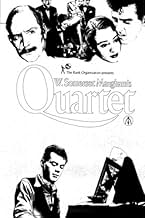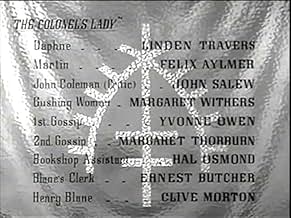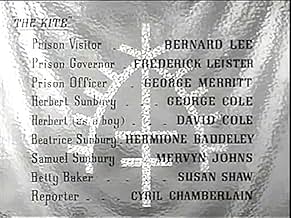Four of W. Somerset Maugham's short stories are brought to the screen with each introduced by the author. In "The Facts of Life", a young man with great potential on the tennis courts goes t... Read allFour of W. Somerset Maugham's short stories are brought to the screen with each introduced by the author. In "The Facts of Life", a young man with great potential on the tennis courts goes to Monte Carlo and ends up doing the exact opposite of what his father recommended. In "The... Read allFour of W. Somerset Maugham's short stories are brought to the screen with each introduced by the author. In "The Facts of Life", a young man with great potential on the tennis courts goes to Monte Carlo and ends up doing the exact opposite of what his father recommended. In "The Alien Corn", an aspiring pianist devotes himself to perfecting his artistic skills, but f... Read all
- Awards
- 2 wins total
Featured reviews
===== THE FACTS OF LIFE (directed by Ralph Smart) is one of the most entertaining stories of the four, with both an interesting story process and a surprise ending. Here, we have a father giving his son three precepts before sending him 'out into the world' on his own. 'The world,' here, is short-term trip to a tennis match in the South of France . The son breaks all three precepts and still succeeds in spite of breaking his father's rules. The aggravating part for the father is that it makes a fool of him at his club. This is like the Polonius– Laertes relationship turned on its head. The consequences aren't great enough to be that important, and one can't help but feel that Maugham is doing a spoof on the superficiality of the upper-class Club set. (8/10)
===== THE ALIEN CORN (directed by Harold French) This story, starring Dirk Bogarde and Honor Blackman, left me cold. Not only is it uninteresting, but the ending is telescoped almost from the outset. Also, it is hard to believe that Honor Blackman's character might not have guessed that anyone who would rather study piano for two years than show ANY interest in her at all either has a hormone deficiency or she just plain doesn't turn him on. One wants to cry out, 'Honor, can't you take a HINT!!' This guy is NOT the marrying kind. Too bad the people in those days couldn't just ask, 'Are you gay? OR 'Do you love me at all?' before emotionally investing in a two-year experiment, leading nowhere. (3/10)
===== THE KITE (directed by Arthur Crabtree) was fun because of the English humor; the story about a boy growing up with the unusual hobby of kite flying; and the fact that his parents not only encouraged him to look no further than his hobby but TOTALLY join him in his one and only passion. To most parents, it is OK to have a hobby but not to the exclusion of a social life. I loved the competition interaction between the possessive kite-flyer's mother (Hermione Baddeley) and her son's fiancée, and later wife, Betty (Susan Shaw). Though this story ends in a somewhat conventional way, the process is where the fun comes into play. (7/10)
===== THE COLONEL'S LADY (directed by Ken Annakin) is probably the best of the bunch. Here, we have an extremely important man, doing his extremely important work, and giving little attention to his wife. When she publishes a book of poetry, under her maiden name and gets paid for it, he is mildly annoyed. When he learns from everyone everywhere that her poetry is not only great by that it is salacious, he becomes VERY annoyed. But, worst of all, he finds out from his mistress that the author's poetry about her affair with a younger man is so realistic that it could only be true. After 'the light bulb finally lights up' in this very important man's head, he is SO annoyed that he actually reads the book himself!! This story is great, both for the way it unfolds and the way it ends. (10/10)
The second story, starring Dirk Bogarde, is also a bit unbelievable, and also a bit tragic. How tragic is it to not be good at the thing you love? After two stories about wealthy sons, Maugham writies "The Kite". in which he tries to aim for the Middle Class and the usual mother-in-law-wife tug of war. The story is a bit banal, but because of the author, we view it with greater meaning.
The best, however, is last. "The Colonel's Lady" is not about his mistress; it is about his wife. This short story is the type of writing that only Maugham and very few others are capable of creating. It is touching, incisive, and heartfelt. To be able to accomplish so much in such a short time is truly amazing. These stories, and particularly the last one, are not to be missed.
A set of four half-hour movies built on stories by Somerset Maugham, who also introduces the movie. They all have a witty naturalism that's totally likable, and the slice of life insights are sometimes even moving. You can only get so far into complexity in a short time, but these do well at packing their narrative efficiently. Really enjoyable. And, especially for those of us who aren't British, they are a total insight into British life (mostly upper class British life, for sure, and mostly post-war era).
It's hard to go into them all in detail but I'll point out the key thing to each that makes them watchable. I'm not talking plot, but some other quality. As follows.
The Facts of Life: The most fun might be the first, logically placed. A man is given advice by his father before going to Monte Carlo (that rich person's den of temptation). And things go exactly backwards, without the son really having a thing to do with it. You mostly smile and enjoy the ride.
The Alien Corn: More straightforward (except the title), and reveals a common Maugham theme of getting the practical British old folks to appreciate an artist's sensibility. In this case it's music. And it runs into a shocking final chord. Idealism up against the wall.
The Kite: Really a tale of a marriage that comes unhinged on one basic misunderstanding. Both main characters (man and wife) are stubborn about certain principles, and it comes to a rather simple kind of violence between them. And a resolution. Touching.
The Colonel's Lady: Certainly more touching, a funny and brilliant and sad bit of writing and stunning acting. This is probably the most involved of the group, and it's just tightly made, a short story in feel, and yet with enough layers to make it really lasting.
All of these are about real life and real people, and small things that end up mattering quite a lot. It's a different experience than a single feature movie, yes, but a refreshing one, with built in refreshment breaks. If you like this approach (sort movies in group), check out the Maugham inspired sequel of sorts called "Encore."
This represents the first of the trilogy of films adapted from his insightful short stories.
'The Facts of Life' is interesting for the tantalising performance of Mai Zetterling whilst the least effective and pointless story is 'The Kite' featuring George Cole, an actor about whom I have never been entirely convinced who was lucky enough to find his niche on the small screen. In the tragic 'Alien Corn' directed by Harold French, aspiring pianist George is informed by virtuoso Lea Makart that he simply does not have that 'extra something' that makes a great artiste. Faced with this devastating judgement even the love of luscious Honor Blackman as Paula cannot offer him sufficient consolation. Excellent performances from Dirk Bogarde and the always magnificent Francoise Rosay.
Judging from previous reviews the jubilant surprise in the collection is 'The Colonel's Lady' directed by Ken Annakin. A perfectly judged and beautifully observed performance here by the immaculate Cecil Parker and a touching portrayal by Nora Swinburne as his wife whose 'scandalous' book of poetry causes all sorts of trouble. There is a very amusing scene where a literary critic played by Ernest Thesiger, likens her verse to that of Landor and Sappho which prompts Parker to storm off muttering 'Idiot!' The final reconciliation of husband and wife is beautifully understated. Excellent adaptations by R. C. Sheriff and a first class score by John Greenwood. It is undoubtedly this, the last of the set, which is the pearl in the crown.
Did you know
- TriviaThe symbol on the title page of each story is a W. Somerset Maugham superstition. Copied by his father on a trip to Africa, it is a Moorish symbol to bring good luck and ward off the evil eye. Maugham had it printed in his fourth novel, but unfortunately upside-down and the book flopped. Printed correctly on subsequent books, he became a best-selling author and had the motif reproduced everywhere, including his Riviera house, Villa La Mauresque.
- Quotes
W. Somerset Maugham - Host: In my twenties, the critics said I was brutal. In my thirties, they said I was flippant; in my forties, they said I was cynical; in my fifties they said I was competent - and then, in my sixties, they said I was superficial.
- ConnectionsFeatured in Raiders of the Lost Archive: Episode #1.3 (2009)
- SoundtracksAlouette
(uncredited)
French Canadian Traditional
Sung by all in the Cabaret room in "Facts of Life" segment
- How long is Quartet?Powered by Alexa
Details
- Release date
- Country of origin
- Language
- Also known as
- Quartett
- Filming locations
- Gainsborough Studios, Islington, London, England, UK(studio: made at Gainsborough Studios, London, England.)
- Production company
- See more company credits at IMDbPro
- Runtime2 hours
- Color
- Aspect ratio
- 1.37 : 1
Contribute to this page



































